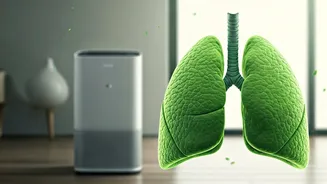Who's Most Vulnerable?
According to Dr. Vivek Nangia, Vice Chairman & Head of Pulmonology at Max Super Specialty Hospital, Saket, while everyone is at risk, certain groups face
heightened danger from Delhi's polluted air. Children under 5 and the elderly over 60 are particularly susceptible. Individuals with existing health conditions like Bronchial Asthma, COPD, chronic bronchitis, or interstitial lung disease, alongside those with chronic heart, liver, or kidney disease, diabetes, or other comorbidities, are at increased risk. People with low immunity, including those with HIV, individuals using long-term steroids, or those undergoing cancer treatment, are also highly vulnerable. The surge in pollution during festive periods exacerbates these risks, making preventive measures even more crucial for those most susceptible.
Immediate Actions to Take
To reduce exposure and safeguard your respiratory health, doctors recommend several immediate actions. Staying indoors whenever possible and limiting outdoor activities to essential tasks is paramount. Wearing N95 or N99 masks, which filter 95–99% of PM2.5 particles, is also crucial. Those with pre-existing conditions like asthma or COPD should strictly continue their prescribed medications and consult their doctor for emergency drugs. Avoiding strenuous exercise outdoors, particularly during periods of heavy smog, is equally important. Additionally, keeping indoor air clean by using air purifiers or HEPA filters and incorporating indoor plants like areca palm, peace lily, or snake plant can help to improve air quality and provide some relief.
Natural Lung Support
Alongside the precautions above, several natural remedies can aid in lung protection. Practice deep breathing exercises such as Pranayama, Anulom Vilom, and Kapal Bhati to strengthen respiratory function. Regular steam inhalation with a few drops of eucalyptus oil can help clear airways. Maintaining hydration and consuming antioxidant-rich foods like fruits, vegetables, turmeric, ginger, cinnamon, and tulsi can also support your respiratory health. Using a saline nasal spray can help remove pollutants from your airways. Furthermore, avoid burning incense, candles, or mosquito coils indoors, and quit smoking to further protect your lungs and reduce exposure to harmful pollutants.
Addressing Symptoms Promptly
If you experience symptoms due to high pollution, seek immediate medical attention. According to Dr. Nangia, common symptoms include cough, cold, sore throat, burning eyes, heaviness in the head, breathlessness, and chest tightness. Dr. Pankaj Chhabra, Clinical Director of Pulmonology at Marengo Asia Hospitals Faridabad, emphasizes that anyone with persistent cough, wheezing, or chest tightness should consult a physician immediately. Ignoring symptoms can worsen respiratory and cardiac conditions, especially during periods of heavy smog. Early intervention and medical advice are crucial to prevent the escalation of health issues and ensure prompt treatment.












